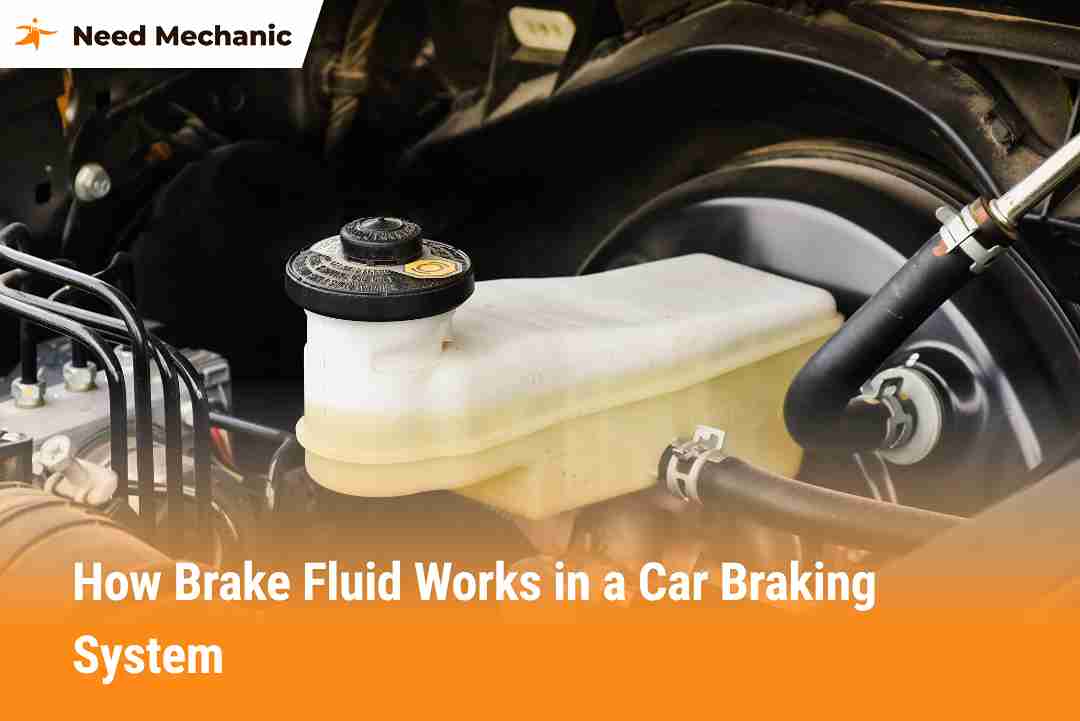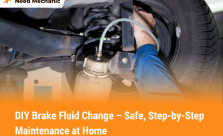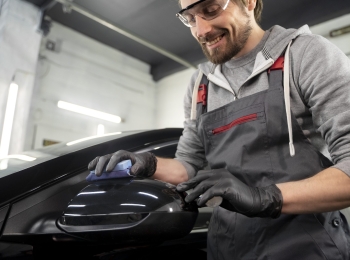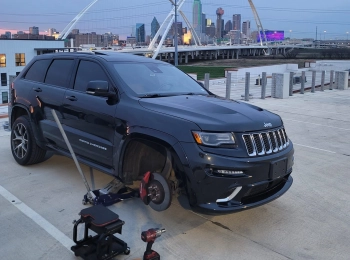Brake fluid transfers the pressure from your foot on the brake pedal to the wheels, allowing your car to stop. It’s a special hydraulic liquid that makes modern braking systems work. Without it, pressing the pedal would not slow your car down at all. While that’s the short answer, understanding how brake fluid works, why it breaks down over time, and when to replace it is essential if you want to drive safely and avoid costly repairs.
Table of Contents
The Role of Brake Fluid in Your Car
Brake fluid is the hidden link between you and the road. When you step on the pedal, that small movement is transformed into powerful pressure that pushes the brake pads against the rotors. This process happens instantly and evenly across all four wheels, giving you the stopping power you expect. If the brake fluid is weak, dirty, or contaminated, the pressure transfer is delayed or reduced, which directly impacts how quickly your car can stop. That’s why keeping it in good condition is critical to safety.
How Brake Fluid Works in the Brake System
Every braking action relies on hydraulic pressure. The brake pedal activates the master cylinder, which pushes brake fluid into lines running to each wheel. Because liquids don’t compress easily, the force is carried straight to the calipers. Those calipers then squeeze the brake pads against the rotors, creating friction that slows the car. The entire system depends on brake fluid maintaining its strength under extreme heat and pressure. If the fluid absorbs moisture or forms air bubbles, that pressure weakens and the brake pedal feels soft or spongy.

Types of Brake Fluid You’ll See
Not all brake fluids are the same. Most cars use one of these common types:
- DOT 3 – Affordable and widely used, but absorbs water quickly.
- DOT 4 – Handles higher temperatures, making it common in modern vehicles.
- DOT 5 – Silicone-based, doesn’t absorb water, but not always compatible with ABS systems.
- DOT 5.1 – Similar to DOT 4 but with even better heat resistance.
Choosing the right one matters. Using the wrong brake fluid type can damage seals, reduce braking performance, or shorten system life. Always check your owner’s manual before topping off or replacing it.
Why Brake Fluid Breaks Down Over Time
Even though it sits in a closed system, brake fluid isn’t permanent. Over time, it absorbs moisture from rubber hoses and seals, lowering its boiling point. Once the boiling point drops, the fluid can form vapor when heated, creating compressible bubbles that weaken brake response. Moisture also causes corrosion inside brake lines and calipers, which leads to expensive repairs. This is why experts usually recommend replacing brake fluid every two to three years, depending on driving conditions.
Signs You Might Need New Brake Fluid
Brake fluid often gives warning signs when it’s no longer doing its job properly. If your brake pedal feels soft, sinks lower than usual, or takes longer to stop the car, the fluid may be contaminated. Checking the reservoir can also reveal issues, clean brake fluid is clear or amber, while dark, dirty fluid signals it’s time for a flush. Sometimes the ABS light will turn on as a result of poor fluid quality, and in extreme cases, you may notice a burning smell after heavy braking. These are all red flags that should never be ignored.
Why Replacing Brake Fluid Is So Important
Changing brake fluid isn’t just routine maintenance, it directly improves safety. Fresh fluid ensures that pressure transfers instantly from your foot to the wheels, giving you faster and more predictable stopping power. It also protects key components like the master cylinder, calipers, and ABS pump from rust and corrosion, which extends the life of your braking system. By preventing moisture buildup, new fluid lowers the chance of sudden brake failure and helps you avoid costly repair bills down the road.
Conclusion: Small Fluid, Big Safety Impact
Brake fluid may seem minor compared to motor oil or fuel, but it’s the very thing that makes safe stopping possible. It transfers pressure instantly, keeps your braking system responsive, and protects parts from damage. Replacing it on schedule improves safety, prevents expensive repairs, and ensures peace of mind on the road. Something so small makes all the difference when it comes to protecting you and your passengers.
FAQs
What does brake fluid do?
Brake fluid is the key link between your foot and your car’s wheels. When you press the pedal, this specialized fluid instantly transfers that force through hydraulic lines to the brake calipers. These calipers then squeeze the brake pads against the rotors, creating the friction needed to stop the car quickly and evenly. Simply put, without brake fluid, your car cannot stop. Keeping it clean and at the right level is essential for safe driving.
How often should brake fluid be replaced?
You should typically replace brake fluid every 2 to 3 years, but this can vary based on your specific car and how much you drive. Over time, brake fluid naturally absorbs moisture from the air, which makes it boil easily under hard braking. This moisture also causes rust inside your brake lines. Replacing it regularly keeps the whole system strong and prevents internal rust. If you’re uncertain about your car’s schedule, you can use NeedMechanic to post a request for a quick fluid inspection during your next service visit.
What happens if brake fluid is too low?
Low brake fluid is a major safety concern and can lead to serious brake problems, like a soft, “spongy” pedal or much slower stopping. Low fluid usually signals a leak somewhere in the system or worn-out brake pads. When the level drops too far, air can get into the brake lines, which stops the hydraulic pressure from working correctly. You must never drive with low fluid. Use NeedMechanic right away to find and contact a professional mechanic who can fix the leak before it causes complete brake failure.
What should brake fluid look like?
Fresh brake fluid is clear or a light amber color, similar to fresh cooking oil. If the fluid in your car’s reservoir looks dark brown, cloudy, or dirty, it means it has absorbed too much moisture and collected rust or debris. Dark fluid is no longer effective and needs to be replaced immediately. Regularly checking the color helps you catch contamination problems before they severely reduce your stopping power.
Can I mix different types of brake fluid?e
No, absolutely do not mix different types of brake fluid (like DOT 3, DOT 4, or DOT 5). Each type has a specific chemical makeup and different heat resistance levels. Mixing them can ruin your car’s seals, damage the ABS components, and severely reduce your braking power. Always check your owner’s manual for the exact type your vehicle requires. When in doubt, you can rely on professional guidance; use NeedMechanic to find a certified technician who will ensure only the correct fluid is used in your system.
Does brake fluid affect ABS brakes?
Yes, clean brake fluid is crucial for your Anti-lock Braking System (ABS) to work correctly. The ABS depends on the fluid’s pressure to react instantly and “pump” the brakes to prevent your wheels from locking up during a sudden stop. Old or dirty fluid can block the tiny valves inside the ABS pump, which slows down the system’s reaction time or can even damage the expensive pump itself. Replacing the fluid on schedule keeps your ABS smooth, accurate, and ready for emergency braking.
Can I replace brake fluid myself?
You can replace brake fluid yourself, but it is complicated and requires special tools for “bleeding” the system. Bleeding is necessary to remove every single air bubble from the lines. If any air remains, the brakes will feel spongy and unsafe. Because of the precision needed for safe braking, most drivers prefer professional service. Using NeedMechanic is the easiest way to find experts who will flush the old fluid, correctly refill the system, and test your brakes thoroughly for safety.
What are signs you need new brake fluid?
Common signs that your fluid is old or contaminated include: a soft or spongy brake pedal that sinks too easily; noticing that your car takes longer to stop; seeing dark, dirty fluid in the reservoir; or the ABS warning light turning on. If you experience a burning smell after braking hard, that’s another bad sign. If you notice any of these, replacing the fluid promptly can restore proper braking performance and safety.
Why does brake fluid go bad over time?
Brake fluid goes bad because it naturally absorbs moisture through the rubber hoses and seals in your car. This moisture lowers the fluid’s boiling point. When you brake hard, the heat causes the moist fluid to boil and create vapor bubbles. These bubbles compress easily under pressure, meaning your foot’s force never fully reaches the wheels, which dangerously weakens your braking. This is why changing the fluid every few years is essential.
Why is replacing brake fluid so important?
Replacing brake fluid is vital because it ensures the highest level of braking efficiency and safety. Fresh fluid maintains the correct hydraulic pressure, prevents rust and corrosion that destroy internal brake parts, improves your response time during emergency braking, and extends the life of costly components like the ABS pump. Neglecting this maintenance can lead to unsafe conditions and very expensive repairs later.












Leave a Reply